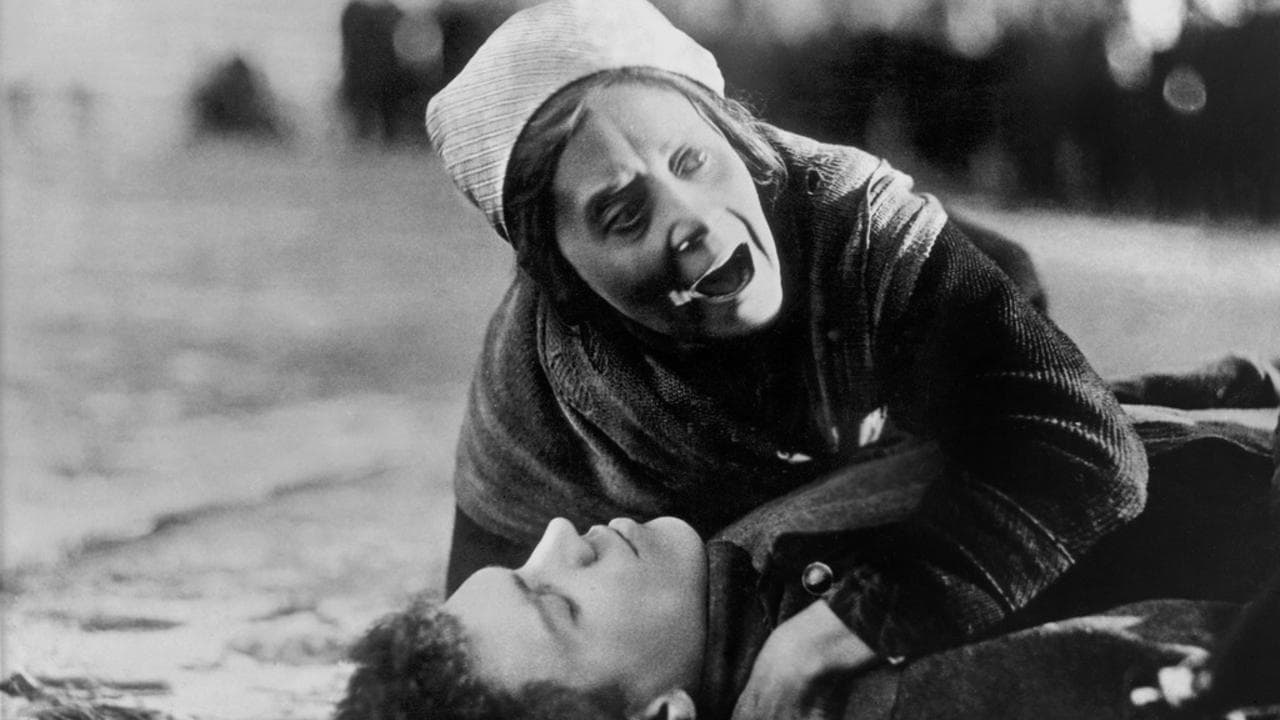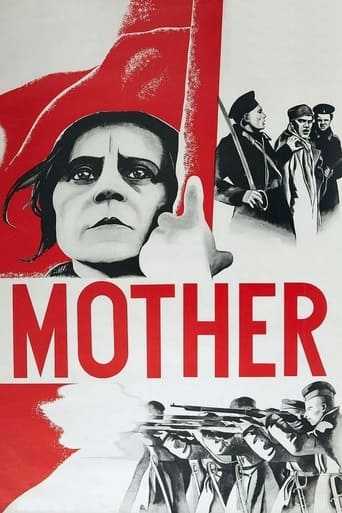

Максим Горький (Maxim Gorky), the novel author, has a direct link with the origin of cinema, as he was one of the first to write about it; on the 22th of June in 1896 Gorky witnessed one of the earliest film productions of the Lumière brothers, an experience that would be the basis for 'in the realm of shadows'.Gorky was impressed by film's potential to be an universal language, the ability which Мать (Mother) illustrates by adapting his written work to the screen so even the illiterate Russian people could understand his story.Всеволод Пудовкин (Vsevolod Pudovkin)'s style is more akin to the social realism (although this is influenced by the fact that the novel can be categorised as social realism) that Stalin would prefer, in contrast to the more abstract and jarring montage of Сергей Эйзенштейн (Sergei Eisenstein). A particular form of montage that he used in this film is worth mentioning, namely the fragmentation of action. Pudovkin 'cuts' the action into several different shots that only show a part or fragment of the action, when assembled in a montage the viewer's mind fills in the blanks (cf. Gestalt psychology) to create the illusion of a complete action. The most known example of this technique in Film is probably the shower scene from Psycho. This in itself proves the impact the Russian film school has had on film practices in general.To conclude, Мать (Mother) is historically important and on some parts technologically innovative. However, if it seen on itself and in comparison to other works of the time, for me it does not hold up as well as most film theorists and critics would have you believe.
... View MoreFive movies were made based on Gorky's novel: in 1920 by Aleksandr Razumnyi, in 1926 by Vsevolod Pudovkin, in 1941 by Leonid Lukov, in 1956 by Mark Donskoy (starring Aleksey Batalov as Pavel Vlassov), and in 1990 by Gleb Panfilov. Also Bertolt Brecht put the novel on stage in 1932. Hanns Eisler created, based on the novel, a cantata for chorus, solo voices and two pianos in 1935.From all this list, undoubtedly impressive by number and persons implied, I was able to watch only the silent made in 1926 by Vsevolod Pudovkin. Politics aside, it is a masterpiece. He was one of the greatest Soviet filmmakers of the 1920's avant-garde (in the same line with Kuleshov, Eisenstein, and all the others), and this movie proves it brilliantly.Pudovkin's movie has an architecture that is radically different from that of the novel. One is talking about very recent events, the other is framing the facts and personages into a paradigm. Both are strongly motivated politically, but the two political moments are very different: the novel is made in the aftermath of the 1905 Revolution, it's real time life, while the movie comes in the first years of Soviet power, preoccupied to build the official history of the revolution, in other words the founding mythology. While Gorky tells us a story of life flowing naturally, with personages of flesh and bones, Pudovkin demonstrates a paradigm, deals with a myth in the making. And in any myth the facts and personages are no more just facts and personages like anything else from real life: they are prototypes aiming to convey a sense. I'll give you only one example: the bridge over the river separating factory and the neighborhood. At Gorky it's just a bridge, nothing else. At Pudovkin it is a path you take to leave your submissive life and enter the revolutionary struggle. So it becomes a prototype within a paradigm, conveying a metaphysical significance.Gorky's novel inaugurates the Socialist Realism: it means its approach is realist to the bone, so its style is traditional (following the traditional Realism of the 19th century, that were to be observed by all Socialist Realist artists). Does also the movie belong to the Socialist Realist style? I don't think so. I would say that by the contrary it belongs hundred percent to the avant-garde of the twenties, so it rejects totally the tradition. It is a Constructivist oeuvre, calling in mind maybe the Expressionist movies made in Germany in the same epoch. These artists of the twenties, totally committed politically, while thinking to build the new society based on their radically new form of art and throwing over the board all that was old, traditional, classic, Realism included. The thirties would stop them forcefully, they would have to obey to the party dogmas or go to hell (the first circle or beyond).A few words about the cast: Vera Baranovskaya made a remarkable performance in the role of the mother; she would play one year later in the following movie made by Pudovkin, The End of St. Petersburg; Nikolai Batalov (1899-1937), who played in the role of the son, was also Soldier Gusev in Aelita (a fine role in a fine movie); it seems that he was not related to Aleksey Batalov, who played Pavel Vlassov in the movie of Mark Donskoy from 1956; and last but not least, Pudovkin himself in the role of a police officer- the guy really enjoyed the negative roles
... View Morea film of its time. adaptation of touching work. a good cast. a great montage. water as symbol, key and word for a silent movie about human storm. large isles of propaganda. and powerful, precise, touching silhouette of masterpiece. it is more than a film or page of history. more than instrument of regime. more than a kind of reflection for a profound social metamorphose. it is a unique meeting. with a subtle art to glorify a regime without sacrifice the truth. a show of nuances. and fabulous act of Vera Baranovszkaia. her role is exploration of small pieces of mother heart. the novel of Gorki is scene for one of powerful demonstration to present reality behind the words. and this is secret of this movie like many others Russians films. the heart of a sensitivity in perfect light, with delicate shadows.
... View MoreIn wintry 1905 Russia, "Mother" Vera Baranovskaya (as the Mother) toils over housework, while son Nikolai Batalov (as the Son) sleeps. Hard-working husband and father Aleksandr Chistyakov (as the Father) arrives home to drunkenly slap his wife around. In the opening minutes, these three characters are clearly drawn. The younger man represents collective (striking) workers while his father sides with the (oppressive) establishment. "Mother" Russia must balance love and duty. Her final decision should come as no surprise. This film highly regarded but sometimes difficult to follow. Director Vsevolod Pudovkin moves the story effectively, with quick shots. This should help you stick with it for the excellent final thirty minutes.******* Mat (10/11/26) Vsevolod Pudovkin ~ Vera Baranovskaya, Nikolai Batalov, Aleksandr Chistyakov, Ivan Koval-Samborsky
... View More